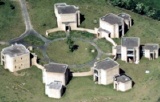2016-17 Warwick EPSRC Symposium: Emerging PDE models in Socio-Economic Sciences
15-19 May 2017
Organisers: C. Elliott (Warwick), P. Markowich (Cambridge and KAUST), M.-T. Wolfram (Warwick)
Scientific summary: Nonlinear partial differential equation models arising from coarse graining procedures for the behavioural patterns of large numbers of individuals have become a powerful tool in socioeconomic sciences. These patterns can be analysed on the mesoscopic and/or macroscopic level by studying the limiting mean field PDEs, which lead to nonlinear kinetic or hyperbolic equations. These PDEs are fairly well understood in classic applications like physics, far less is known in novel applications in socio-economic sciences posing significant challenges to researchers. In this workshop we want to foster the communication among scientists working in different fields (analysis vs. numerics, kinetic vs. hyperbolic, whole space vs. graphs) as well as on different applications. The workshop will focus on the following topics and the strong connections between them :
(1) Kinetic models in socio-economic applications: Kinetic models describe both social and economic phenomena such as opinion formation or the dynamics of a price and give a statistical description of systems with many interacting particles viewed as trading agents or individuals in a society with simple local interaction laws. A Boltzmann type equation describes the time evolution of the particle density probability function and allows to study asymptotic regimes and universal behaviours.
(2) Hyperbolic equations describing pedestrian dynamics: Hyperbolic conservation laws derived from fluid dynamics have become a powerful tool to describe the transient evolution of large pedestrian crowds or traffic simulations, for example, the Hughes model coupling a nonlinear conservation law to an eikonal equation. The low regularity of its solutions poses challenging problems for the mathematical analysis and numerical simulations.
(3) Mean field game models in socio-economic applications: Mean field game models with a highly nonlinear structure in space and time can be derived by a coarse-graining procedure from stochastic optimal control problems, using Nash equilibria. Mean field game models have spread from economic applications to social sciences (pedestrian dynamics, opinion formation or knowledge growth).
(4) PDEs on graphs and networks: Network and graph structures are important in understanding diverse effects such as the dynamics of information, communication or aggregation in social networks. Especially applications in image processing, optimisation on networks or the identification of clusters in social networks are of high interest. There has been a lot of novel developments at the interface between graph theory, high dimensional data and PDEs.
Confirmed participants:
- Andrea Bertozzi (UCLA)
- Henri Berestycki (EHESS Paris)
- Martin Burger (WWU Muenster)
- Jose Carrillo (Imperial College London)
- Emiliano Cristiani (IAC CNR, Rome)
- Young-Pil Choi (TU Munich)
- Pierre Degond (Imperial College London)
- Bertram Duering (University of Sussex)
- Massimo Fornasier (TU Munich)
- Yves van Gennip (University of Nottingham)
- Paola Goatin (INRIA Sophia Antipolis)
- Diogo Gomes (Kaust)
- Jan Haskovec (Kaust)
- Alexander Lorz (Paris 6)
- Braxton Osting (University of Utah)
- Lorenzo Pareschi (University of Ferrara)
- Dejan Slepcev (Carnegie Mellon)
- Eitan Tadmor (University of Maryland and ETH Zuerich)
- Andrea Tosin (Politecnico di Torino)
- Yao Yao (Georgia Tech)
See also:
Mathematics Research Centre
Mathematical Interdisciplinary Research at Warwick (MIR@W)
Past Events
Past Symposia
Where possible, visitors should obtain an EDUROAM account from their own university to enable internet access whilst at Warwick.
You can register for any of the symposia or workshops online. To see which registrations are currently open and to submit a registration, please click hereLink opens in a new window.
Mathematics Research Centre
Zeeman Building
University of Warwick
Coventry CV4 7AL - UK
E-mail:
MRC@warwick.ac.uk

